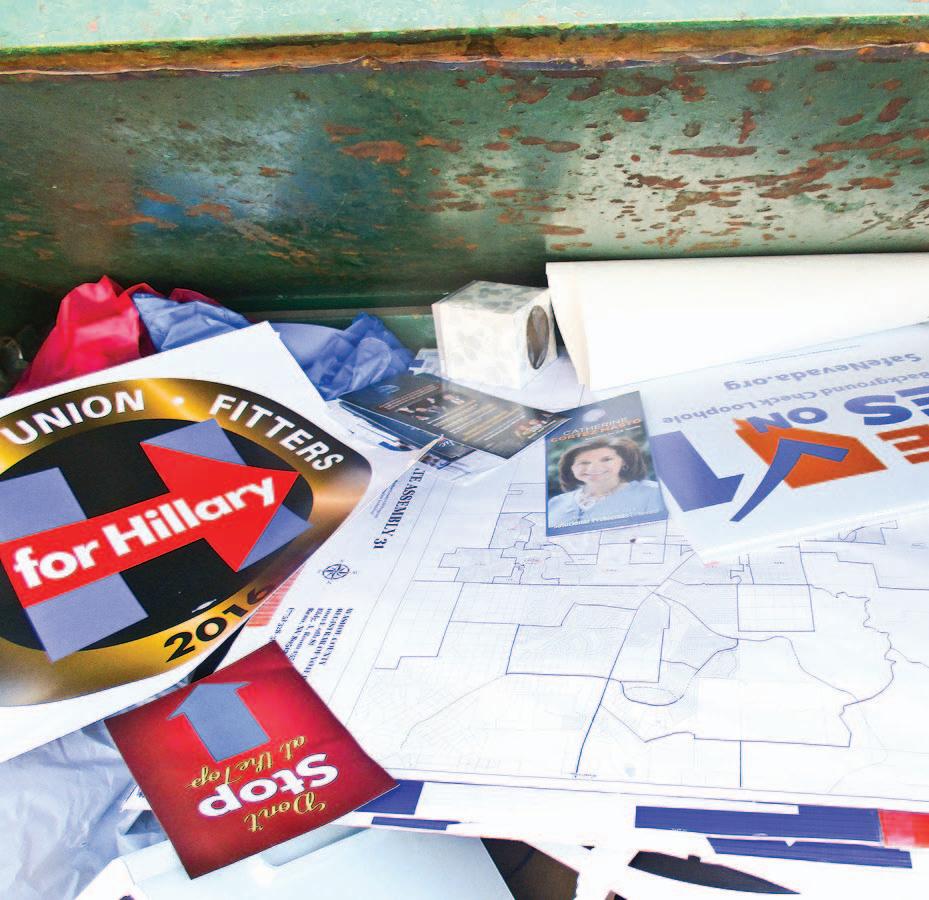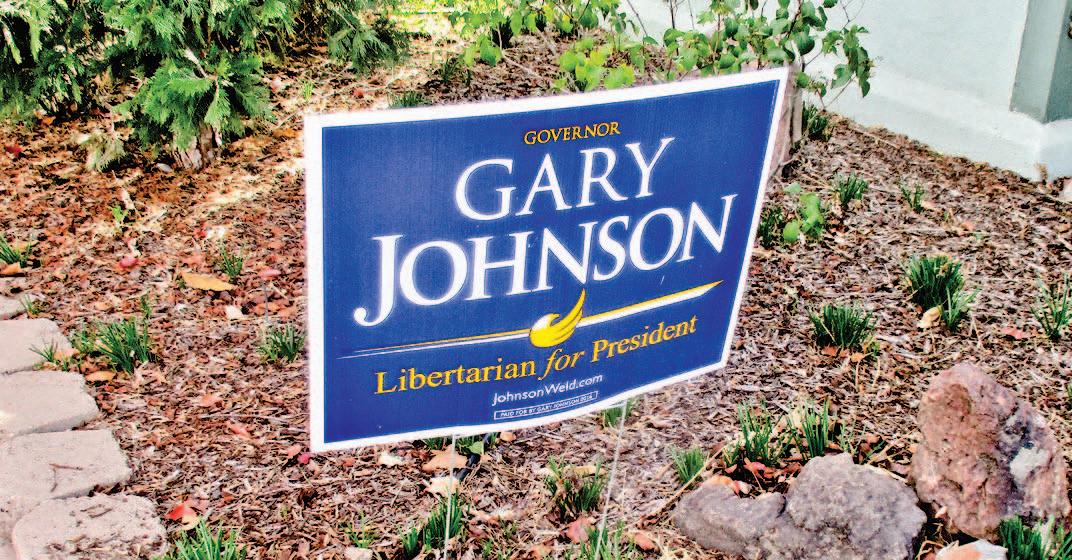
9 minute read
News
from Nov. 17, 2016
Will electors step in?
There is a lot of talk going around about presidential electors protecting the country from a Donald Trump presidency.
Advertisement
The founding fathers—they were all men—created the presidential electors system as a back-up to the election. The public would elect, but the electors would have to ratify the public’s election by appointing the new president. If they thought the public had made a mistake by irresponsibly choosing a dangerous character to be president, the electors could choose someone else entirely.
After losing the election, Trump is likely to win the appointment by the electors on Dec. 19. He collected 290 electors while Hillary Clinton got 228, though 1,002,049 more voters—at press time, a figure still growing—supported her. Nevada has six electors, the number of its members of Congress. A case can be made that a candidate like Donald Trump is exactly the reason the founding fathers created the presidential electors.
As it happens, we no longer have presidential electors as the founders created them.
The founders labored hard to prevent “factions”—as political parties were then called—from having a role in the system, but legislatures have long since turned the job of selecting candidates for elector over to the parties. As U.S. Supreme Court Justice Robert Jackson wrote in a 1952 court opinion, “This arrangement miscarried. Electors, although often personally eminent, independent and respectable, officially became voluntary party lackeys and intellectual nonentities.” The loyalty of presidential electors now is first to their parties.
The founders expected that the electoral votes would be among the finest people in the community who would be free to vote any way they wanted. Once again, the legislatures got in the way. Many states now have laws barring electors from voting as they wish. Those laws require electors to vote as the state votes, not as their district votes or they wish to vote.
Then there is the winner-take-all feature of the presidential electors system. This, too, was not the intent of the founders. They thought electors would be chosen by district and would represent their districts. Instead, most states—except for Maine and Nebraska—have winner-take-all systems.
Was Trump the kind of threat the founders envisioned? Only free-agent electors would know that, and we no longer have them. The party hacks who serve as electors now are hardly the figures the founders had in mind to make that decision. In our context, they probably had electors in mind like James Michener, Lee Iacocca, Boone Pickens, Michael DeBakey, Alan Shepherd, Frank Lloyd Wright.
Constitutional convention delegate Elbridge Gerry provided the only specific when he said, “The ignorance of the people would put it in the power of some one set of men, dispersed through the Union and acting in concert, to delude [the public] into any appointment. … [S]uch a society of men existed in the order of the Cincinnati.” The Society of the Cincinnati was a veteran’s group with considerable influence, but that doesn’t help us much.
No Democrat has ever become president after losing the election but winning appointment. Rather, only Democrats have been victims of electoral appointments. Democrats won election four times and their opponents—John Quincy Adams, Rutherford Hayes, Benjamin Harrison, George Bush—were appointed president instead. Now a fifth occasion is impending.
In other words, the Democrats had plenty of opportunities to remedy the current version of the presidential electors system that the founders never envisioned. In 2009, the Democrats had huge, historic majorities in Congress only eight years after Al Gore won the election and George W. Bush won the appointment as president. Democrats did nothing. It’s happening again because the Democrats let it happen again. —Dennis Myers
A dumpster at Greenbrae Shopping Center, where a Democratic staging location was located, is filled with campaign remains—precinct maps, Clinton posters, ballot Question 1 yard signs, leaflets for innumerable candidates, precinct walk lists.
PHOTO/DENNIS MYERS
Getting ready
Groups and causes at issue
During the week since the public voted against Donald Trump for president, a number of individuals, institutions and interests have spoken the impact of his being appointed to the job by presidential electors anyway.
Organized labor, which conducted aggressive campaigns for Hillary Clinton and down-ballot Democrats in Nevada, is not saying much about what it expects of Trump. Nevada AFL-CIO executive Danny Thompson said in a prepared statement, “We are calling on all those elected to work for the betterment of working families in Nevada and across the country. The election is over. But we are more committed than ever to helping working people win a voice on the job and in our democracy.”
The Communications Workers of America were a bit more specific: “CWA and the labor movement are more determined than ever to protect working families, jobs and communities, and we’re ready [to] hold President-elect Trump to his promises to advance the middle class.”
A movement for higher minimum wages around the nation made some gains. Voters in Arizona, Colorado and Maine voted for $12 minimum wages by 2020, Washington to $13.50 by 2020. They join 17 states and an unknown number of cities who had already raised minimums in earlier elections.
In 2006, Nevada raised the minimum to a dollar higher than the national minimum. But tying the state minimum to the relatively stagnated federal minimum is questioned by some.
Economic Analysis and Research Network analyst David Cooper said after the election, “With so much activity at the state level, some lawmakers and business groups have argued that there is no need to raise the federal minimum wage and that minimum wage policy should be ‘left to the states.’ Unfortunately, this attitude has left roughly 40 percent of the U.S. workforce subject to minimum wages that are woefully inadequate.”
Twenty-one states have the federal minimum of $7.25.
The casino lobby expects a lot from Trump. American Gaming Association CEO Geoff Freeman: “The AGA will leverage our industry’s 40-state presence to coalesce a powerful network of Congressional leaders willing to promote favorable public policies and block overzealous federal efforts that add unnecessary costs and inefficiencies to our businesses. While we are optimistic a Trump Administration will feature significantly more restrained federal agencies than what our industry and many others experienced over the last eight years, the challenges before us remain great. … Tuesday’s results ushered in a new era in Washington, D.C. The gaming industry is well positioned to thrive in this new environment.”
Among Muslims, Council on American-Islamic Relations Ibrahim Hooper spokesperson, said, “I don’t think leaving the country is what anyone would recommend. … We’re here, we’re not going anywhere, and we’re going to defend our rights and the rights of all Americans regardless of who’s in the highest office in the land.”
Environmental groups worry Trump will succeed in ending the Clean Power Plan, exacerbating climate effects such as wildfires in the Great Basin. The CPP, proposed by President Obama in 2015, is intended to reduce anthropogenic climate change by setting standards for power plants and for states to reduce carbon pollution, thus encouraging the growth of clean energy.
It is under challenge in court— Nevada’s Republican attorney general has signed on to that challenge—and was enjoined by the U.S. Supreme Court until the appeals process is complete. U.S. Sen. Harry Reid, who during his tenure reduced Nevada’s reliance on coal, called the CPP a way of reducing “carbon pollution, extreme weather and rising sea levels.”
What Trump’s administration will mean for women is far from certain. MomsRising.org CEO Kristin RoweFinkbeiner, said in a statement, “Many of us are reeling. Some of our children have difficult questions about their own safety, about their friends, and about the future of our country.”


Make It Work Action co-director Vivien Labaton said, “Families are drowning under out of reach child care costs, no access to paid family leave, and a persistent gender and racial wage gap. President-elect Trump needs to prove that he is going to work for women and working families by prioritizing the issues that we face every day. The proposals on paid leave and child care that Trump unveiled as a candidate were woefully inadequate. They would primarily benefit wealthy families, and they exclude fathers and nontraditional families.”
Nevada gained a woman U.S. senator, a woman U.S. House member, two women in the Nevada Senate and one woman in the Nevada Assembly. Both state legislative houses flipped from Republican to Democratic, possibly a reaction to the hard-edged right wing agenda of the 2015 legislative session, including a program that paid Nevada parents to take their children out of public school. The Assembly is now 27-15 Democrats, the Senate 11-10.
Battle Born Progress executive director Annette Magnus said in a statement, “We now expect the tone of the upcoming legislative session to be very different from the 2015 session where workers rights, civil liberties, women’s rights and access to public education were under constant attack. Today is only the beginning. Our work isn’t over. We will now work to hold all of our elected officials accountable and ensure that they are representing all of the people who elected them.”
“Nevada voters made a clear statement about the direction they want for their state,” said EMILY’s List vice president Lucinda
Guinn. “Voters have rejected the antiwoman, anti-family agenda of both Nevada chambers. EMILY’s List is an national group that provides early funding for women candidates. Though Nevada has just made regulated marijuana legal, prohibitionists such as Smart Approaches to Marijuana say they will “explore legal options against the industry and we will continue to engage in states with stakeholders around this issue, as well as with the new U.S. Congress and presidential administration.” A research site This includes “making sure data is collected, municioffers voters palities are empowered to ban stores in their neighborhoods, and the help industry pays for their damage.” Coalition to Regulate Marijuana Like Alcohol spokesperson Joe Brezny responded that “members of law enforcement will now be able to spend their time preventing and investigating serious crimes that actually harm people. As we move forward, we look forward to working with legislators and regulators to ensure that this system is regulated in a manner that benefits consumers and enhances public health.” To help citizens keep track of the new president’s record, ProCon.org is a 501c3 nonprofit educational site. Its CEO, Kamy Akhavan, said, “We have spent the last year finding Donald Trump’s statements on 75 policy issues from death penalty (pro) and same-sex marriage (con) to fracking (pro) and oil company subsidies (con) to medical marijuana (pro) and closing Guantanamo (con). Our staff of professional researchers have scoured articles, speeches, interviews, transcripts, you name it.” Ω

NOVEMBER 19, 2016 – JANUARY 22, 2017
LEAD SPONSOR The Bretzlaff Foundation
MAJOR SPONSORS Clark/Sullivan Construction; Eldorado Resorts; Sandy Raffealli, Porsche of Reno
OPENING TALK Neither Common nor Everyday: The Barbara R. Gordon Folk Art Collection
SATURDAY, NOVEMBER 19 / 2 PM
$12/$8 MEMBER Tickets at NevadaArt.org
One local resident sees no reason to take down the yard sign for his preferred candidate.

This exhibition is drawn from the Barbara L. Gordon Collection and is organized and circulated by Art Services International, Alexandria, Virginia.










